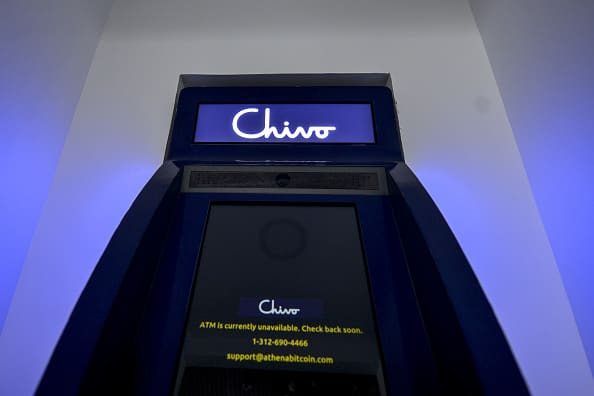
A Chivo Bitcoin ATM (ATM) at the Multiplaza Mall in San Salvador, El Salvador, on Saturday, August 28, 2021. El Salvador began installing Bitcoin ATMs, allowing its citizens to convert the cryptocurrency into US dollars and withdraw it in cash, as part of governments’ plans to make the currency legal tender.
Camilo Freedman | Bloomberg | Getty Images
El Salvador bought bitcoin worth about $ 20.9 million, a day before it formally adopted the world’s most popular digital currency as legal tender.
In a series of tweets on Monday, President Nayib Bukele revealed that the country had bought a total of 400 bitcoins, the first step in a larger push to add digital currency to its balance sheet.
The tweets were posted a few hours apart. Based on the price of bitcoin at the time of the tweets, the amount of digital currency purchased amounted to about $ 20.9 million.
“Our brokers will buy a lot more as the deadline approaches,” He wrote.
The price of bitcoin rose after tweets and was trading at around $ 52,681.85 at 12:16 p.m. on Tuesday.
The posts came hours before El Salvador’s bitcoin law, passed in June, went into effect on Tuesday. El Salvador is the first country to accept bitcoin as its legal currency, which will operate alongside the US dollar. Advocates and critics around the world will be watching to see how this unprecedented experiment unfolds.
Bukele’s announcement marks an important milestone for Bitcoin. El Salvador is now the first country to officially put bitcoin on its balance sheet and keep it in its reserves.
But politics has drawn criticism across the country. About 70% of Salvadorans surveyed by the Central American University did not agree with the administration’s decision to adopt bitcoin as a legal tender. Many were also unsure of how to use digital currency.
Supporters of the El Salvador movement say it indicates a growing acceptance of bitcoin and that other countries could follow suit. The Salvadoran government expects it to push for financial inclusion in a country where about 70% of citizens do not have access to traditional financial services, according to bitcoin law.
Remittances, or money sent home by migrants, are also important to the economy, accounting for more than 24% of El Salvador’s gross domestic product, according to the World Bank.
The legislation allows prices to be displayed in bitcoins, tax contributions to be paid in digital currency, and bitcoin exchanges not to be subject to capital gains tax.
El Salvador launched a portfolio application called Chivo for which citizens can register with a national identification to make transactions with bitcoin. Users will receive $ 30 worth of bitcoins upon registration to expedite adoption.
Last Tuesday, Congress in El Salvador passed a law to create a $ 150 million fund to help facilitate the conversion of bitcoin to U.S. dollars.
But bitcoin is known for its wild volatility at times, which raises concerns about its effectiveness as a currency.
“Bitcoin is not really designed to be a medium of exchange, so it’s an early experiment for the currency,” Philip Gradwell, chief economist at the data platform Chainalysis, told Capital Connection. from CNBC.
“I think the main use in El Salvador will really be around remittances and the people who use it to save some wealth and maybe just to be some competition with the country’s dollar.”